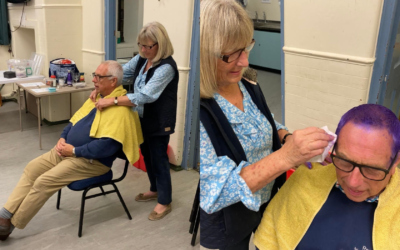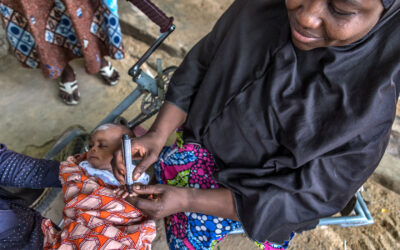Never, never, never give up. So long as Rotary members continue to believe that – so long as we never give up – then polio does not stand a chance.
That was the message delivered by Microsoft founder, Bill Gates, speaking at a Rotary conference in Spokane, Washington.
He used the platform to urge Rotarians and the world not to give up in its fight against polio, with the battle in the closing stages.
Thirty years ago, Bill Gates pointed out, there were more than 40 new polio cases an hour. Today, there are fewer than 33 polio cases a year.
“And instead of polio being in 125 countries, today all but three are certified polio-free: Pakistan, Afghanistan, and Nigeria. And we hope that Nigeria will be coming off the map soon,” he told the audience.
It was in the mid-1980s when Rotary International began its campaign to fight polio.
And in 1988, Rotary helped to found the Global Polio Eradication Initiative along with the World Health Organization, UNICEF and the Centers for Disease Control & Prevention.
The last 40 cases are far more difficult than the first 400,000. And preventing them takes more experience; it takes more grit – and more learning and innovation.”
Bill Gates hailed the role of Rotary International for leading from the front.
He added: “In the years since, Rotarians have proven themselves heroes in public health.
“Not only has this organisation raised more than $1.8 billion dollars to fight the disease – you have fought it yourselves, sometimes on the front lines.
“Here’s another way of looking at it: There are more than 18 million people walking the Earth today who would have otherwise been paralysed by polio. And none of it would have happened without you.”
Bill Gates admitted that the burning question on everyone’s lips was when would polio finally be wiped from the face of the earth?
“We’ve come so close to eradication that now it’s easy to imagine it happening. Instead, people wonder: When can we stop imagining? When will polio eradication be real?” he asked.
“It’s a fair question. When this initiative started, the head of the World Health Organization declared that we could eradicate polio from – and I quote – ‘spaceship Earth by the year 2000’.
“But by the turn of the millennium, about 33 per cent of the world’s population was still living in countries where the virus was still endemic.
“That’s when our foundation (Bill & Melinda Gates Foundation) got involved. And although we’ve come so close to zero in the years since, that magic number has eluded us.
“Last year, the total number of polio cases worldwide was 33.
“I think all of us are frustrated by this. But Rotarians most of all.”
Together, we can achieve what @Rotary first envisioned: a world where no child will be struck with polio ever again. This weekend, I was honored to thank @RotaryRassin and other Rotarians in person for their dedication to the fight against polio. https://t.co/sYNHU7RqGS
— Bill Gates (@BillGates) May 19, 2019
“Each year, many of you travel around the world, saving children from a terrible disease two drops at a time – and everyone hopes it will be the last year you have to do it; that we’ll have no need for polio vaccination campaigns anymore because polio won’t exist.
“But I also think most of us understand the challenge: Fighting polio today is much harder – and different – than fighting it the 80s and 90s.
“The last 40 cases are far more difficult than the first 400,000. And preventing them takes more experience; it takes more grit – and more learning and innovation.”
Bill Gates pointed to the success of eradicating polio from India and which has now remained disease-free for five years.
And he highlighted the work of vaccinators in Nigeria where they can predict where the disease will be by understanding the geography of polio.
“Even in the world’s most dangerous places, we’ve shown that we can stop polio in its tracks,” added Bill Gates, pointing to the work of vaccinators who dealt with two million refugees fleeing war-torn Syria to Jordan, Lebanon and Turkey.
He added: “So back to the question: When will we eradicate this disease? I think the answer is: sooner than recent history indicates.
“We’ve not only cornered the last few cases of polio – we’ve also spent the last few years sharpening the tools and the strategies to finish the job.
“The only question is whether we have the will to do it.
“Whether people and governments still believe eradicating polio is worth it. And that’s more of an open question than I would like.”
Over the next five years, the Global Polio Eradication Initiative will need a total of $3.27 billion to continue its work, and Rotary will be at the heart of that fundraising.
Projections show that if the world gave up the fight against polio today, as many as 200,000 children could be affected annually by 2029.
Bill Gates acknowledged the thought that this money could be better spent on other similarly worthwhile causes, rather than a handful of cases for a specific disease.
But, the American businessman described fighting disease akin to fighting a fire – it’s not enough to put out most of it. Unless you extinguish it completely, the disease comes roaring back.
And projections show that if the world gave up the fight against polio today, as many as 200,000 children could be affected annually by 2029.
“Within 10 years, we’d backslide to where we were 40 years before,” he added.
“Back around 2013, when Ethiopia looked to be free of the wild poliovirus, a few cases cropped up.
“For those who’d spent years fighting the disease there, it was frustrating. But Rotarians who travelled to Ethiopia stuck by a motto: never, never, never give up.
“So long as Rotarians continue to believe that – so long as we never give up – then polio does not stand a chance.”










